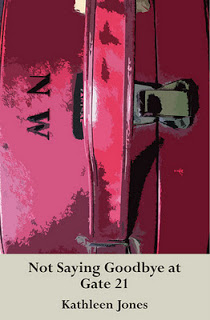Kathleen Jones is a noted biographer and poet whom I have previously interviewed for this blog, in particular about her excellent recent biography of Katherine Mansfield, and who is one of the Tuesday Poets. She was also kind enough to provide an endorsement for my recent collection Men Briefly Explained.
Reviewing books by people one knows and likes is both easier and harder than reviewing books by complete strangers. Easier, because this knowledge might give the reviewer a little more insight into the writer’s work – not that I am claiming any special insight!; and harder, because it is always possible that, despite liking the writer, the reviewer might not like the book.
I’m delighted to report that I don’t have this problem with Kathleen Jones’ latest book, her first full poetry collection, Not Saying Goodbye at Gate 21. I like this book a lot, and furthermore, I liked it more and more as it went on.
If I was asked to say what this collection was about in three words (one of which had to be a conjunction), I’d say ‘landscape and character’. My favourite poems in the collection are those which bring the two together, and since almost all of them do this, I was a happy and engaged reader throughout.
Many of these landscapes are harsh. Kathleen Jones has spent much of her life in Cumbria, in the north of Britain, and many of these poems bear the harshness of that northern landscape, the sense that the flesh over the bones of the earth is thin. But the collection begins even further north, in the glacial north of Russia, where
From the lake’s edge the land seems
to go on forever – beyond politics,
into the impossible distances
of history, where women still
wash their clothes in the stream
and sleep above the stove.
(“Aiming for Archangel: Lake Onega”)
Winter is even more to the fore in “Winter Light”, which Helen Lowe recently featured as a Tuesday Poem on her blog, and intimate relationships are described in terms of snow and winter too:
Under the duvet’s white drifts
we trespass unconsciously —
a sleeping thaw that threatens
waking separation.
(“The Silence of Snow”)
Many of these poems feature a woman choosing, or preparing to choose, wintry solitude over warm entanglement – or having solitude imposed on her by circumstance, as in the title poem.
All the same, I think my very favourite poems in the book are those which are not (ostensibly, at least) about the narrator of the poems, but about an external figure. I chose “‘To the Gods the Shades'”, about a 1st-century Roman occupier of Britain guarding the Empire’s northern border, as my Tuesday Poem this week because I admire the way in which Kathleen Jones evokes the man, his times, and the country in which he serves, all in 24 economical lines, not a word wasted, nothing flashy (which would be inappropriate for this poem), everything achieved by the skilled deployment of language. The high point of this poem for me is
scouring the Tyne gap through this bleak
border town where everything closes at five —
lines that bridge the gap between historical and modern times with the complaint of a cosmopolitan traveller, a complaint such as ancient Roman or modern Briton might equally make.
Not Saying Goodbye at Gate 21 is full of such deft touches. Worth reading, worth re-reading.


Thanks Tim – a lovely review. I too loved 'the Eagle of the Ninth' by Rosemary Sutcliffe – really fired my imagination!
Lovely review of a lovely book. When it arrived at my house, I read it in one big gulp. My favourite poems are the personal ones which have a voice that is strong, unflinching and female in the face of whatever life throws at a person, including grief and loss. I was especially moved by the mother and daughter poems. I will re-read the poems you single out again with interest, Tim.
I believe your observation about the poem \”To the Gods the Shades\”, ie \”everything achieved by the skilled deployment of language\” encapsulates the achievement of this very fine collection, Tim.
Deft indeed. I loved this collection and I'm sure I will be returning to it
Thanks for your comments, Kathleen, Mary, Helen and Avril.Mary, these are fine poems too (I don't think there's bad one in the book) but I guess that, for many readers, it's the poems that resonate most closely with their own experience or heritage that mean the most.
I'm very much looking forward to reading Kathleen's collection as I've enjoyed what I've read – reviews and snippets – so far. Thanks for this review, Tim – I'm always fascinated by what the reader/s bring to the poems, how they complete them. All good stuff.
Thanks, Rachel – I think you'll enjoy it!